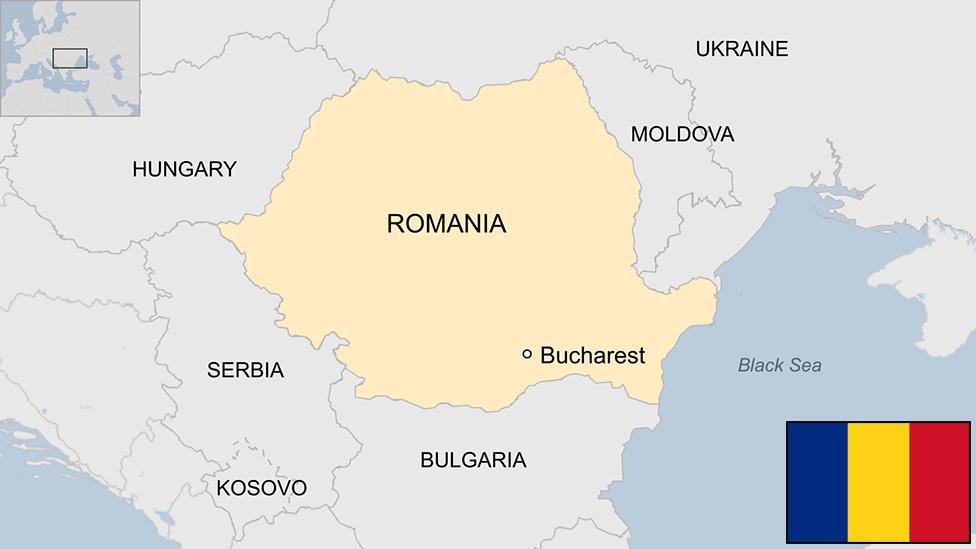Romania acts to save forests from logging spree
- Published
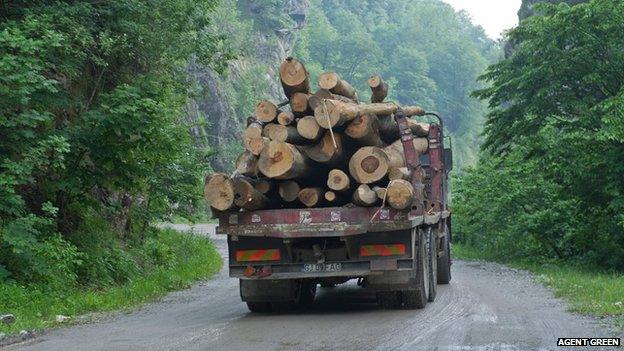
There is mounting concern about the scale of logging in Romania's remote forests
A fierce debate has erupted over a new forestry code in Romania aimed at protecting unique wildlife habitats and controlling the logging industry.
This month thousands of Romanians took to the streets to demand action against dubious sales of forested areas.
Green campaigners back the new code, hoping it will curb illegal logging.
The anti-corruption agency DNA is investigating some officials in the state forest administration Romsilva, as well as some politicians.
The Carpathian Mountains, sweeping in a big arc through Romania, have vast tracts of virgin forest, home to almost half of Europe's wild population of brown bears, wolves and lynx.
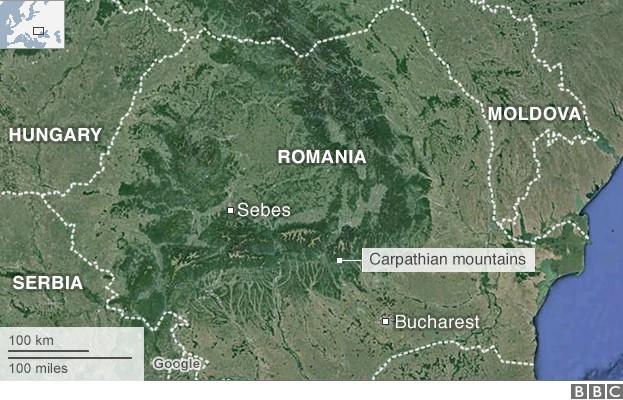
But Gabriel Paun, head of activist group Agent Green, external, complains illegal logging has inflicted losses of at least €5bn (£3.6bn; $5.7bn) on Romania since the communist regime was toppled in 1989.
Deforestation has reduced Romania's forest cover to about 26% of the total land area, he said, "but scientists say 36% should be the minimum".
"Here the national parks are administered by forestry people, but in other countries the parks administration is independent from forestry," he told the BBC.
Agent Green reports that 366,000ha (904,020 acres) of Romanian forest was illegally chopped down in 1990-2011 - some 80m cubic metres (2.8bn cu ft) of wood.
National security issue
A majority of MPs in the Romanian parliament approved the new forestry code on Wednesday, despite disagreements over it.
Prime Minister Victor Ponta's centre-left Social Democratic Party (PSD), the largest group in parliament, backed the code. The PSD emerged out of the old Communist Party.
It was a setback for President Klaus Iohannis, leader of the centre-right National Liberal Party (PNL), who had called for revisions to the text, arguing that it might infringe EU competition law.
He also said illegal logging was serious enough to warrant investigation by the Romanian National Security Council (CSAT).
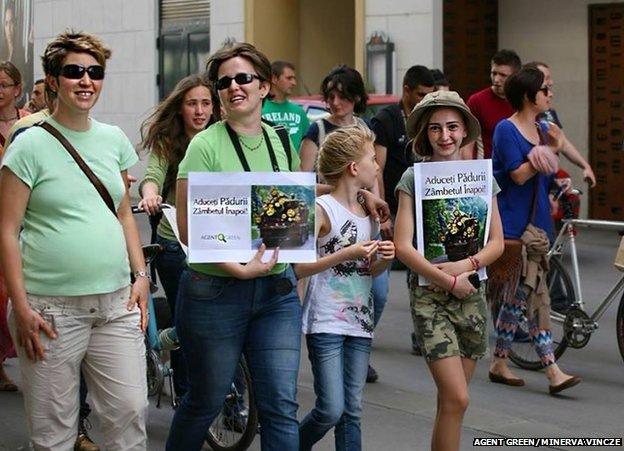
These protesters in Timisoara were among thousands who rallied to protect the forests
Romanian politicians are even considering imposing a temporary ban on timber exports, so that the legal loopholes in forestry management can be sorted out.
The officials under investigation by the DNA include Romsilva head Adam Craciunescu, PSD politicians Ioan Adam and Viorel Hrebenciuc, and PSD senator Ilie Sarbu, who is Prime Minister Ponta's father-in-law.
There are suspicions that some 43,000ha of forest was sold off illegally, when state-owned land was returned to private ownership. The losses to Romsilva are estimated at €300m.
About half of Romania's 6.3m ha of forest is in state hands, the other half held privately.
Doina Pana, the PSD politician who drafted the new forest code, told the BBC that illegal logging had occurred "especially in private forests, not in the forests managed by Romsilva".
Ms Pana said the new code would make it easier for the many smallholders - owning 10ha or less of forest land - to make money legally, instead of resorting to illegal logging. It would also help them "through anti-monopoly measures", she said.
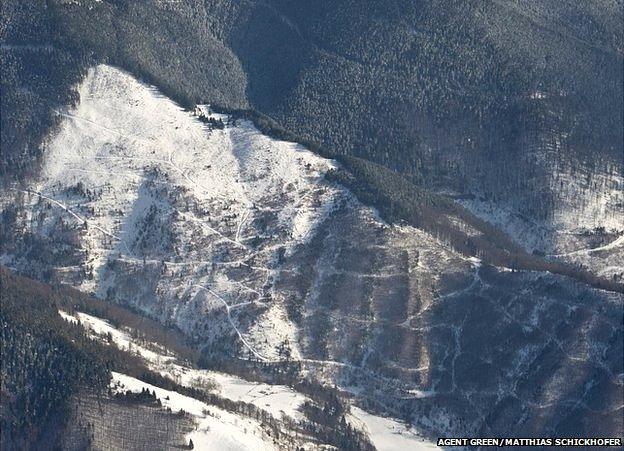
Winter reveals the scale of clearcut forest in Retezat National Park - one area is completely cleared of trees
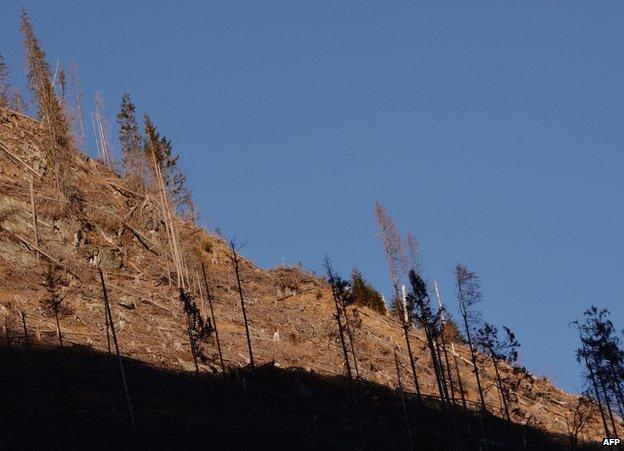
Illegal logging has left bare slopes at Fagaras, in the Pojarna Valley
Austrian business
An Austrian firm, Holzindustrie Schweighofer, dominates Romania's timber processing sector. It operates four sawmills and a fifth - at Reci - will open soon, giving the firm a 29% share of all the Romanian resinous wood on the market.
In a letter to Mr Ponta, external published on its website, Schweighofer objected to a clause in the forestry code which sets a 30% maximum market share per tree species for any one timber firm.
According to Schweighofer, that 30% limit violates EU competition law and, if adopted, the firm could sue the Romanian authorities at an international tribunal and dismiss workers from its Romanian sawmills.
In a statement to the BBC, the European Commission said it was assessing the planned forestry changes in Romania.
It warned that the new legislation must comply with EU law. "While the rules for the management of forests - whether state-owned or privately owned - are set at the level of member states, trade in logs and other forest products is subject to the EU's rules ensuring the free circulation of goods on the EU internal market, as well as to EU rules governing trade with third countries," it said.
Gabriel Paun praised the forestry code's 30% limit, as well as the new rules for Romania's many private smallholdings. "Currently there is half a million hectares with no management structures," he complained.
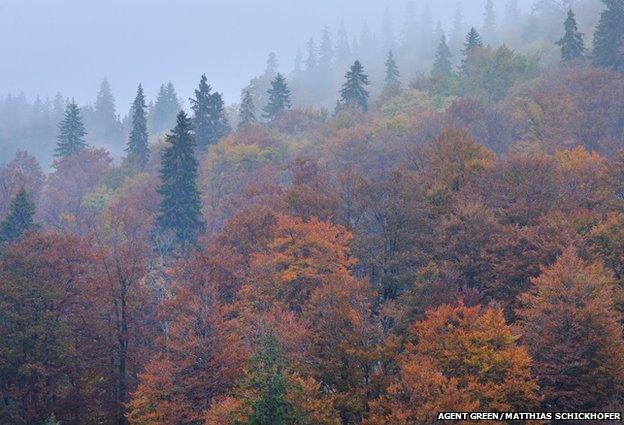
The Carpathian forest is a natural wonder in autumn - and haven for rare species
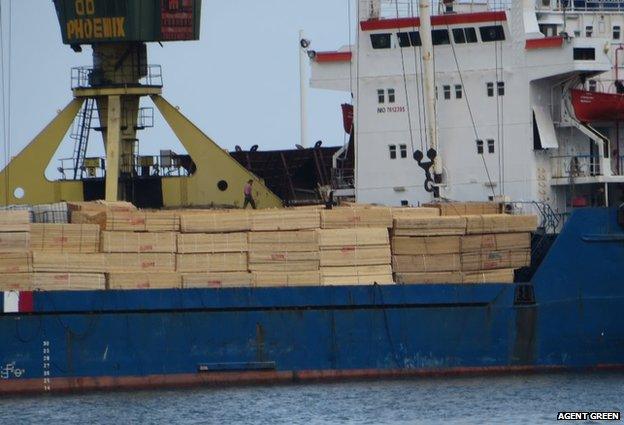
Romania exports timber from the Black Sea port of Constanta
Green protests
Mr Paun accuses Schweighofer of complicity in illegal logging - something the firm strongly denies.
"We totally refuse wood from national parks - even though it is legal from certain regions according to the Forestry Law. Every supplier who does not adhere to our rules or who breaks the law loses his contract with us," the firm says., external
Schweighofer opened its first Romanian sawmill in 2003 at Sebes, and it has invested €778m in its Romanian wood processing operation. It says it is employing more than 3,000 Romanians at its sawmills and more than 10,000 in related jobs.
In a video , external- now on YouTube - Mr Paun reported that he monitored truckloads of logs which police confirmed as illegally harvested. But he was violently prevented from filming at the gates of the sawmill in Sebes.
Mr Paun told the BBC that he had met Schweighofer managers since that incident and "they presented a better checking mechanism for refusing wood from a national park - we welcome that model".
Allegations were also made against the company by a Washington-based group, the Environmental Investigation Agency (EIA).
An undercover video, external on the EIA's website appeared to link Schweighofer to illegal logging. Again the company denied the allegation.
Romania joined the EU in 2007 and is among Europe's main timber producers. More Romanians work in forestry and wood processing than is the case in most other EU states.
The EU's Timber Regulation, external obliges timber firms to make sure they do not source and place on the EU market products made from illegally harvested logs.
But Romania's experience suggests that enforcement remains a problem, and that the EU may have more to worry about than just illegal tropical timber.
- Published19 February 2015

- Published18 December 2024
